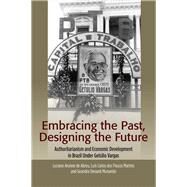Embracing the Past, Designing the Future Authoritarianism and Economic Development in Brazil Under Getúlio Vargas
, by de Abreu, Luciano Aronne; dos Passos Martins, Luis Carlos; Denardi Munareto, Geandra- ISBN: 9781845199647 | 1845199642
- Cover: Hardcover
- Copyright: 1/1/2020
Embracing the Past, Designing the Future provides an historical overview of Brazilian authoritarianism and social/economic development during the political era (1930–45) of Getulio Vargas as viewed and understood by Oliveira Viana and Azevedo Amaral, two of the principal intellectuals and ideologues of the regime at the time. The heart of the discussion is the legitimacy of authoritarian modernization. Brazil’s contemporary uncertainty has deep parallels with the earlier period: unruly and political debate coupled with economic stagnation. It was during the Vargas era that the power bases and fundamental principals of the construction of modern Brazil were defined in terms of its political administration, economy, and industry. These features may still be perceived in the country today, albeit claimed or rejected by political leaders such as Luiz Inacio Lula da Silva. Linkage between authoritarianism and the economic development of Brazil is strong. Both periods of exceptional national economic and social growth were associated exactly to its two governmental authoritarian periods in the twentieth century. This volume addresses a complex of ideological difficulties that go to the heart of what the Brazilian nation stands for: its racial construction; its colonial heritage; the fractured nature of the relationship between society and state; and the dangers of political personalization.






